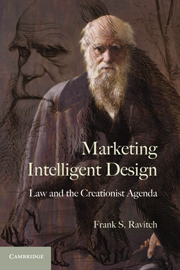Book contents
2 - Big D and Manufactured Paradigm Shifts
Published online by Cambridge University Press: 05 June 2012
Summary
Intelligent design (ID) advocates have argued, although frequently without much philosophical sophistication, that reliance on the current scientific model excludes religious or other nonnaturalistic paradigms from science. If such alternative paradigms are to gain any acceptance, the argument goes, it is essential that they be explored by researchers. This raises the related question of whether such arguments for alternative scientific paradigms must be credited by schools and science departments. The latter question will be addressed in later chapters. For now, it is important to gain an understanding of the implications of the ID movement's use, whether intentional or not, of what are known as relativistic arguments in philosophy. As will be seen, the ID movement is not well equipped to utilize these arguments, and perhaps more important, the work of the progenitors of scientific relativism demonstrates why relativistic arguments do not help the ID movement.
Intelligent Design and Modern Science
Inclusion in the realm of science generally requires that one “do science,” that is, use the tools and methodology of science. To “do science,” one must generally engage in work that allows one's hypothesis to be supported or falsified – that is, that could prove that a scientist's hypothesis might be wrong. Falsifiability is one key element of modern science, an element famously championed by philosopher Karl Popper, who attempted to define the parameters of modern science. Still, arguments can be made that suggest that Popper's definition of science is simply one paradigm for science and that there is no superparadigm that allows one to prove the correctness of a given scientific paradigm. As explained later, this argument can be supported by the work of the scientific historian Thomas Kuhn, but ironically, Kuhn's arguments when taken as a whole work against ID.
- Type
- Chapter
- Information
- Marketing Intelligent DesignLaw and the Creationist Agenda, pp. 39 - 60Publisher: Cambridge University PressPrint publication year: 2010

